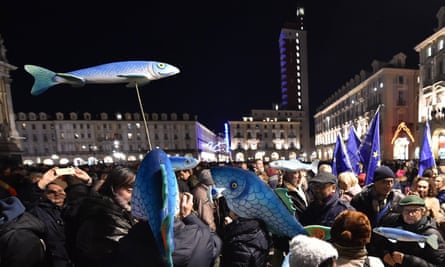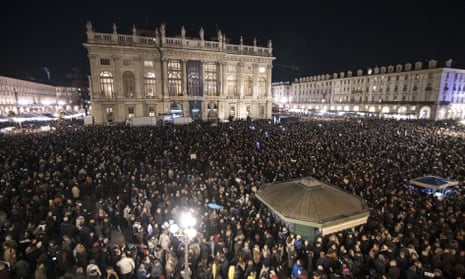Clutching rosaries, prayer books and a large crucifix, a group of around 20 people gathered outside a court in Turin on Tuesday morning to pray for Matteo Salvini. The leader of the far-right League and Italy’s former deputy prime minister is on trial in the northern city for allegedly defaming the judiciary, but he didn’t show up for the first hearing.
The fan club, called I Cinque Sassi (The Five Rocks), emerged in response to the “Sardines”, a rapidly proliferating movement against the politics of Salvini and his far-right allies. “The only fish that interests us is the symbol of the first Christians,” Angela Ciconte, the group’s founder, told reporters outside the court.
But they might need more than prayer to effectively compete with the Sardines, who in the last month have packed themselves tightly in ever-increasing numbers into piazzas in city after Italian city.
Hours after the vigil, 35,000 people crammed together like sardines in Turin’s Piazza Castello for the latest demonstration by a movement that sprung up in Bologna in mid-November in reaction to Salvini’s pledge to “liberate” the Emilia-Romagna region from the left in elections in late January.
“We are here to say we have had enough of this boorish, vulgar politics cultivated by selfies and fake news,” said Paolo Ranzani, one of the Turin organisers. “But the left and other political forces are not exempt; politicians need to set an example, right now they’re not doing that.”

The Sardines movement began in November after Mattia Santori, 32, from Bologna, sent an urgent message to three friends late at night telling them to meet the next day. It was a couple of days before Salvini and his coalition partners, the smaller far-right party Brothers of Italy, and Silvio Berlusconi’s Forza Italia, were due to launch their campaign for the Emilia-Romagna regional election at an indoor sports arena in Bologna. Over lunch, the four friends hatched a riposte to Salvini’s boasts about filling Italy’s squares with supporters. The sports arena had a capacity for 5,700 people, and so, via an announcement on Santori’s private Facebook page, the group invited people to a counter-rally at Bologna’s Piazza Maggiore, with the aim of attracting 6,000 people.
“Salvini and Giorgia Meloni [leader of Brothers of Italy] were announcing themselves as liberators of the region and we wanted to peacefully express our dissent,” said Andrea Garreffa, one of the four friends.
What happened next confounded their expectations: 15,000 people filled the Bologna square. As Salvini’s far-right electoral alliance pursued its campaign, the Sardines converged in other Emilia-Romagna cities before spreading across Italy and beyond. Over 120,000 people are expected to join a national rally in Rome on Saturday.
“We feel very moved by what is happening and to see so many people understanding the message that we’re trying to send out,” added Garreffa. “Politics affects us all and the square is the place to go and discuss and get out of this tunnel vision of social media that divides people instead of building bridges.”

Holding signs depicting sardines and singing Bella Ciao, the Italian resistance song, the crowd in Turin was made up of a mix of people – young, old, Italian, foreign, politically engaged or those who have not participated in an election for some time. Their shared aim was to give a strong message against the hate which they say is being cultivated by the far right.
“We are fed up with the hateful language and all the racism and we are here to show that there are so many people in Italy who do not think this way,” said Betty Defilippi, 61.
Juan Puente, a Mexican software programmer who has lived in Turin since 2004, said: “There is a lot of psychological tension right now and Salvini is polarising, but unfortunately there is no strong political force challenging him.”
Salvini’s League was ejected from government in August after his failed gambit to collapse a coalition with the Five Star Movement (M5S) and bring about snap elections. His main achievement when in office was to introduce draconian anti-immigration measures, including closing the seaports off to migrants. The party has lost some support since then, but polling at around 33% it is still the largest in Italy and seized the former leftwing stronghold of Umbria together with its allies in late October.
A combination of the threat of the far right returning to power nationally and growing disillusionment with a coalition concocted between M5S and the centre-left Democratic party is spurring people to join the Sardines rallies.
Salvini has mocked the movement, writing on Twitter that he prefers kittens as “they eat sardines when hungry”. But one thing is for sure – they have managed to erode his dominance of the squares, with 40% of Italians saying in a poll in November that the movement now represents Salvini’s “most dangerous enemy”.
“The movement has demonstrated that Italy does not want to be identified by the barbarism brought about by populism,” said Marco Revelli, a politics professor and president of the Piero Gobetti Centre of Studies in Turin. “It also reflects what used to be the democratic left of this country – they are filling a void, one youngster told me, ‘we are a product of what was missing’.”
The big question now is how the movement will develop.
“We keep getting asked this question and maybe we’ll find an answer in Rome,” said Garraffa. “It will not be us who answers it, it will be the square and participation of the people. After Rome, things will change one way or another.”
